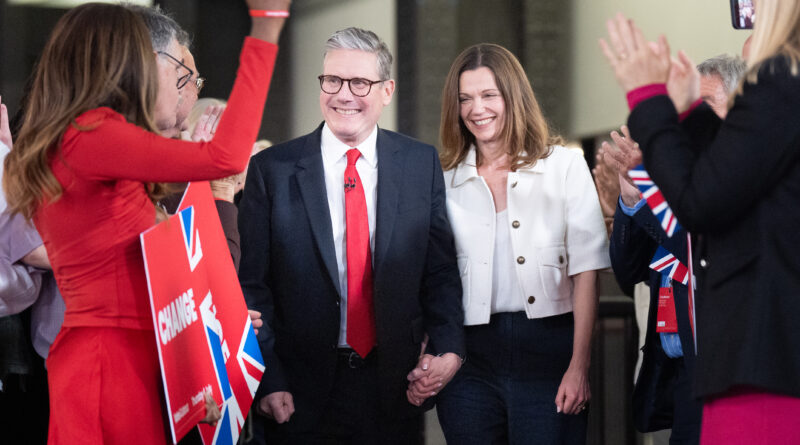How the Labor government can affect your finances – including childcare
SIR Keir Starmer will be Britain’s next Prime Minister after Labor won a landslide election.
Sir Keir Stormer’s party has made a number of promises to voters to help put extra cash in their pockets.

1
But it can be difficult to know what these policies will actually mean for your money.
Here, we look at each of Labour’s manifesto promises and explain how they will affect your finances after the party’s victory.
Retirement
Labor has pledged to keep the triple pension lock in place, which is good news for pensioners worried about the cost of living.
The “triple lock” ensures that the state pension does not lose value by increasing it in line with inflation, average earnings, or 2.5% each year – whichever is higher.
However, Labor did not match the Conservatives’ pledge to increase the tax-free personal allowance for pensioners in line with the state pension.
At present, the state pension is £11,502 a year, and the personal allowance is £12,570.
The Office for Budget Responsibility (OBR) has warned that the state pension will exceed private allowances by 2027.
This could mean that retirees who rely solely on the state pension may face a tax bill in the near future.
Labor also promised to carry out a review of workplace pensions with the aim of increasing people’s retirement savings.
It said in its manifesto: “We will review the pensions landscape to consider what further steps are needed to improve pension outcomes and increase investment in UK markets.”
However, it has yet to provide any further details on what this review will entail.
The party added that it would give the Pensions Regulator, which oversees workplace pension schemes, new powers to intervene where schemes fail to deliver good value for their members.
Labor did not include plans in its manifesto to reintroduce the Lifetime Allowance (LTA), which limits the amount you can save in your pension over your lifetime without paying tax.
The Tories scrapped the LTA this year, but Labor has previously said it plans to bring it back.
finance
Labor has promised it will not increase income tax, national insurance or VAT.
However, independent think tanks are predicting that taxes will rise under Labor – but they have yet to agree which ones.
The party has not pledged to end the freeze on tax rates before April 2028 – the timeframe set by the current government.
This means that more of your income will end up in the taxpayer’s pocket because income increases over time with inflation. Get down on the floor.
Myron Jobson, senior personal finance analyst at broker Mutual Investor, explained: “Labor has ruled out a major tax rate hike but has confirmed that the income tax cap will remain in place until 2028.
“This means that more of our income will end up in the taxpayer’s coffers because incomes increase over time, because your salary rises with inflation, but the tax bracket stays the same.
“Known as fiscal drag, it’s the tax grab that hits the lowest income brackets the hardest.”
The party also pledged to close loopholes that allow some of the wealthiest people living in the UK to avoid paying tax.
Will Labor raise taxes?
Laura Suter, head of personal finance at AJ Bell shares her view on whether Labor can keep its promise not to raise tax for British workers:
“We heard from previous governments that they wouldn’t raise taxes – and then we got higher tax bills with hidden and broken promises,” she said.
“The Conservatives promised not to raise taxes, but instead froze income tax bonds to raise taxes through the back door.
“At the time, they promised not to raise National Insurance before raising short-term health and social care rates – although the government has finally come full circle with recent cuts to NI rates.”
She added: “Recent history shows us that when a political party doesn’t promise to raise taxes, they’re unlikely to stick to it 100 percent. While they may not explicitly raise the taxes they’ve committed to, Yes, the door is still open for tax hikes.
“A clear example is already that Labor has promised not to raise income tax, but they have not put forward a plan to end the marginal freeze, which means people will pay more tax than they would if Inflation has increased.”
Babysitting
Labor has pledged to improve the UK’s childcare system and tackle child poverty, including providing free breakfast to every primary school child.
As part of its manifesto, the party pledged:
- Additional school classrooms will be converted into nursery places, paid for by the end of tax breaks on private schools.
- 3,000 new nursery classes in the UK are opening up access to childcare hours for families
- Supporting three and a half million more parents to re-enter the labor market
- Paying for free breakfast clubs in every primary school in England, closing tax loopholes and preventing tax evasion
- Breakfast clubs to raise attendance and standards and improve behavior and achievement
Sarah Coles, head of personal finance at Hargreaves Lansdowne, said: “There was a clear commitment to parents. [in Labour’s manifesto] – Including breakfast clubs in primary schools, the right to parental leave from the first day of work, and protection against discrimination against pregnant women.
“When added to the role of free childcare for all children under nine months, it can make a significant difference to families.”
Benefits and income
The Labor Charter pledged to reform prosperity and fight poverty, aiming to reduce the number of people dependent on food and increase the number of people in work.
This included a review of Universal Credit, although the party did not give many details about what that would be.
Ms Coles explained: “A big part of the work commitment is to get more people into work, and to change the workplace to ensure that fewer people in work need government support.
“These include things like ensuring a minimum wage that takes into account the cost of living, and ending age bonds, so all adults get the same minimum wage.”
Labor has also pledged to end zero-hours contracts, end “fire and redeployment” and introduce rights to parental leave, sick pay and protection from unfair dismissal from day one, Ms Coles said.
She added, “However, despite being a major factor in child poverty, it has not promised to end the two-child policy – which limits benefits to the first two children in a family.”
Housing and renting
A major cost of living burden over the past few years has been the high cost of housing.
Mortgage rates have risen significantly meaning homeowners have to pay more each month, while rental costs have also risen.
Labor has promised to build 1.5 million homes with the aim of getting more people on the property ladder.
The party also said new buyers will get first dibs on properties in new developments before they are sold to foreign investors.
“Labour is focused on building more affordable housing, prioritizing first-time buyers, and reforming the plan to speed things up,” Ms Coles said.
Meanwhile, Richard Donnell, executive director of research at Zoopla, said the job growth agenda is “positive” as far as it goes.
“The growth agenda is positive but needs to be delivered – the housing market is an extension of the economy so a growing economy and wealth creation is good for homeowners,” he said.
Elsewhere, the party plans to launch a “Freedom to Buy” scheme to help people secure a mortgage.
Donnell says the mortgage guarantee scheme may help 5% of first-time buyers a year.
“However, the pressure is still on new buyers entering the market with little deposit unless we actually increase the supply of affordable homes to buy and rent,” he added.
For tenants, the party promised to end the highly abusive tenancy system, where landlords do not own the land on which their property is built, and ground rent will not be acceptable.
It also confirmed that it would ban no-fault evictions to make it harder for landlords to evict tenants without good reason.
Jamie Gollings, vice president of research at the Social Market Foundation, said: “This will be good news for private tenants, in addition to banning new rental flats and preventing extortion from ground rent and service charges.”
Do you have a money problem that needs to be sorted out? Contact by email money-sm@news.co.uk.
Additionally, you can join our Sun Money Chats & Tips Facebook group to share your tips and stories
#Labor #government #affect #finances #including #childcare
